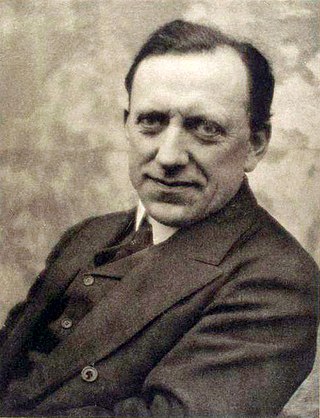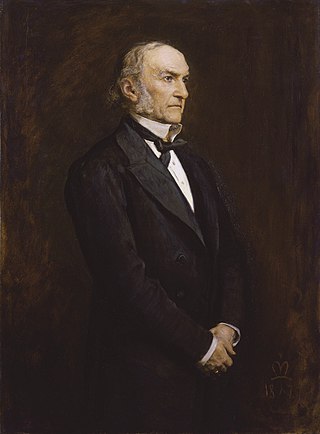Related Research Articles

Joseph Chamberlain was a British statesman who was first a radical Liberal, then a Liberal Unionist after opposing home rule for Ireland, and eventually was a leading imperialist in coalition with the Conservatives. He split both major British parties in the course of his career. He was the father, by different marriages, of Nobel Peace Prize winner Austen Chamberlain and of Prime Minister Neville Chamberlain.
The Liberal Unionist Party was a British political party that was formed in 1886 by a faction that broke away from the Liberal Party. Led by Lord Hartington and Joseph Chamberlain, the party established a political alliance with the Conservative Party in opposition to Irish Home Rule. The two parties formed the ten-year-long coalition Unionist Government 1895–1905 but kept separate political funds and their own party organisations until a complete merger between the Liberal Unionist and the Conservative parties was agreed to in May 1912.
The New Zealand Liberal Party was the first organised political party in New Zealand. It governed from 1891 until 1912. The Liberal strategy was to create a large class of small land-owning farmers who supported Liberal ideals, by buying large tracts of Māori land and selling it to small farmers on credit. The Liberal Government also established the basis of the later welfare state, with old age pensions, developed a system for settling industrial disputes, which was accepted by both employers and trade unions. In 1893 it extended voting rights to women, making New Zealand the first country in the world to enact universal adult suffrage. The Liberal Party became extremely successful, winning seven consecutive elections and the popular vote in each.

James Louis Garvin was a British journalist, editor, and author. In 1908, Garvin agreed to take over the editorship of the Sunday newspaper The Observer, revolutionising Sunday journalism and restoring the paper, which was facing financial troubles at the time, to profitability in the process.
The Australian Workers' Union (AWU) is one of Australia's largest and oldest trade unions. It traces its origins to unions founded in the pastoral and mining industries in the late 1880s and it currently has approximately 80,000 members. It has exercised an outsized influence on the Australian Trade Union movement and on the Australian Labor Party throughout its history.

Joseph Arch was an English trade unionist and politician, born in Barford, Warwickshire, who played a key role in unionising agricultural workers and in championing their welfare. Following their enfranchisement, he became a Member of Parliament.

The Elementary Education Act 1870, commonly known as Forster's Education Act, set the framework for schooling of all children between the ages of 5 and 12 in England and Wales. It established local education authorities with defined powers, authorized public money to improve existing schools, and tried to frame conditions attached to this aid so as to earn the goodwill of managers. It has long been seen as a milestone in educational development, but recent commentators have stressed that it brought neither free nor compulsory education, and its importance has thus tended to be diminished rather than increased.

Gladstonian liberalism is a political doctrine named after the British Victorian Prime Minister and Liberal Party leader William Ewart Gladstone. Gladstonian liberalism consisted of limited government expenditure and low taxation whilst making sure government had balanced budgets and the classical liberal stress on self-help and freedom of choice. Gladstonian liberalism also emphasised free trade, little government intervention in the economy and equality of opportunity through institutional reform. It is referred to as laissez-faire or classical liberalism in the United Kingdom and is often compared to Thatcherism.

Jesse Collings was Mayor of Birmingham, England, a Liberal member of Parliament, but was best known nationally in the UK as an advocate of educational reform and land reform.

Sir Thomas Henry Devereux Berridge, KBE was a British Liberal politician and solicitor.
The National Liberal Federation (1877–1936) was the union of all English and Welsh Liberal Associations. It held an annual conference which was regarded as being representative of the opinion of the party's rank and file and was broadly the equivalent of a present-day party conference.

The Sunday Referee was a Sunday newspaper in the United Kingdom, founded in 1877 as The Referee, primarily covering sports news.

The Queensland Shearers Union was one of the first Australian unions, founded in the latter half of the nineteenth century. The union was instrumental in the development of the 1891 Australian shearers' strike, seen today as a key development in the Australian labour movement. Together with other unions the Queensland Shearers Union was the genesis of the Australian Workers' Union.
Philip Francis Johnson, usually known as P. F. Johnson was an Irish nationalist political labour activist and Kanturk hotel proprietor. Born at Mallow, County Cork, he co-founded in 1869 the Kanturk Labourers’ Club, where he was lifelong committed to the well-being of labourers in the Munster region. He had close Fenian connections and was active in the Land League. Although an anti-Parnellite he supported the Irish National League with a branch in Kanturk.
The Coventry Herald, Coventry Herald and Observer or the Coventry Herald and Free Press was a newspaper that was established in 1808 by Alderman Nathaniel Merridew, a ribbon warehouseman and Congregationalist, in Coventry, England, and ran in print until 1940.

The National Agricultural Labourers Union (NALU) was a trade union representing farm workers in Great Britain.
George M. Ball was a British politician and trade unionist.

The Southwestern Christian Advocate (1877–1929) was an American newspaper published by the Methodist Episcopal Church in New Orleans, Louisiana and distributed in the Southern United States. It was an African American newspaper that was equally read by the White community, this was more so than any other African American newspaper in the Union.
George Mitchell was a British stonemason, who became prominent in the National Agricultural Labourers' Union.

Henry Taylor was a British trade union leader.
References
- ↑ "Second Meeting, 23rd November, 1891. Election of Fellows". Proceedings of the Royal Geographical Society. New Series. 13: 731. 1891.
- 1 2 3 4 5 Mennell, Philip (1892). . The Dictionary of Australasian Biography. London: Hutchinson & Co. pp. 481–482 – via Wikisource.
- ↑ "Births, Marriages and Deaths". The Salisbury and Winchester Journal. 25 July 1857.
- 1 2 3 Alexander, Joseph Aloysius (1928). The Life of George Chaffey. Macmillan. pp. 154–155.
- 1 2 Horn, Pamela (1984). The Changing Countryside in Victorian and Edwardian England and Wales . Fairleigh Dickinson University Press. pp. 114, 119. ISBN 0838632327.
- ↑ Biagini, Eugenio (2002). Citizenship and Community: Liberals, Radicals and Collective Identities in the British Isles, 1865-1931. Cambridge: Cambridge University Press. pp. 152–153. ISBN 0521893607.
- ↑ Horn, Pamela (1971). Joseph Arch (1826-1919): the farm workers' leader. Roundwood Press. pp. 114–148.